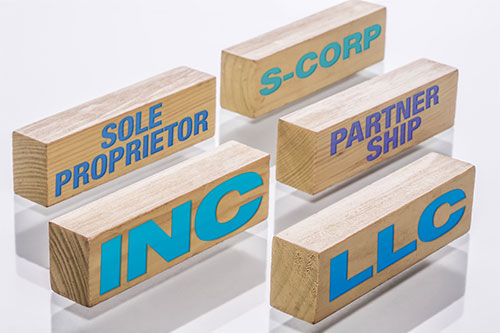5 Factors When Choosing a Business Entity
Almost always, the best place to discuss business entity decisions is in your accountant’s office. While this resource can give you an overview of the decision factors, your accountant can ask questions to get to the best solution for your business. Here are six major factors in your decision:
- Raising Capital
Should you need to raise capital for starting your business or you expect to need capital in the future for expansion and growth, the business entity you choose influences the ease of finding lenders and the regulation that goes along with borrowing money for the business.
The sole proprietorship entity is the most widely used to get started in business as an individual. However, borrowing money for startup or growth will hinge mostly on the owner’s personal credit rating and likely require some assets to guarantee the loan. Many sole proprietors take out loans against their home to fund their business.
Other entities like S-Corporations, Partnerships, LLCs, and C-Corporations have varying levels of governmental regulations when borrowing for the business. There can be advantages however, as some borrowing can be done without the personal guarantees of owners.
- Tax Treatment
The most important decision involved in business taxation is if the owner(s) want to avoid double taxation on taxable income. C-Corporations are taxed at the business level on income and then the shareholders are taxed again on money distributed to them. Forming as an S-Corporation, Partnership, or LLC avoids this, as these businesses can be classed as pass-through entities. This means that the income from the business is passed through to the owners/members to be taxed at their personal tax rates on their tax returns.
- Liability Protection
The sole proprietor’s personal assets are at risk from lawsuits and debts incurred by the business. This also applies to general partnerships. For limited protection from business debts, activities, and lawsuits, the owner(s) must elect to form as an LLC, C-Corporation, or S-Corporation. If your business is one that has a significant risk of customer or other legal actions, choosing an entity formation with limited liability protection should be considered.
- Transferring Ownership
The sole proprietorship must be sold in total to transfer ownership. Partnerships must be dissolved and then sold in total as well. C and S corporations make transferring ownership much easier, as the owners can simply sell or transfer their ownership shares to others. Shares of stock are the only form of ownership in those corporate entities.
- Ease of Formation
After reading the previous four factors, some would think that there forming their business as a sole proprietorship or partnership would be the last thing they would want to do. However, especially when just starting out, the ease of forming the sole proprietorship or partnership is worth consideration. They are relatively easy to get going, less paperwork, and fewer regulatory issues (some state regs for partnerships).
When it comes to the other entities, S and C corporations and LLCs, there is significantly greater hassle in forming the entity, registering with the state, and in required management and reporting activities.
Armed with this information, you can meet with a accountant to discuss your business, growth expectations, and personal financial situation to make an informed decision.

